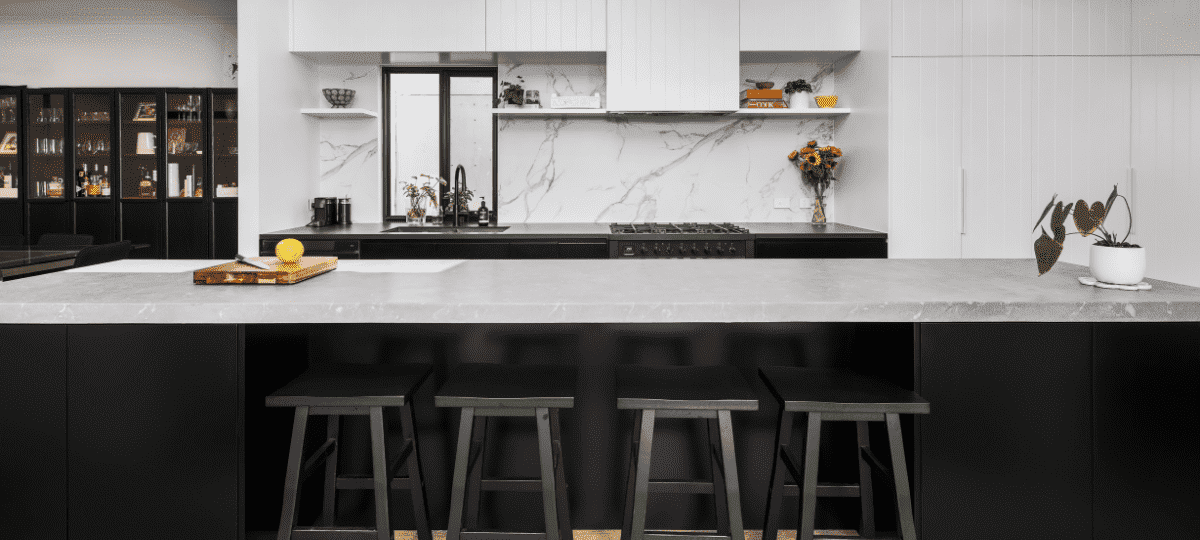Kitchen Benchtop – How to choose one for your kitchen?
The benchtop is the largest horizontal surface in your kitchen and it can often be the main visual feature of the space. It’s not unusual for homeowners to be unsure of how to decide on the best colour, texture and material for this important element of their new kitchen or kitchen renovation. Here, we break down your choices and provide you with all the relevant factors you’ll want to consider when making your selection of kitchen benchtop.
- Kitchen benchtop basics
- Kitchen benchtop materials
- Kitchen benchtop elements
- Kitchen benchtop trends
- How to choose a kitchen benchtop material
- What does Brilliant SA recommend and why?
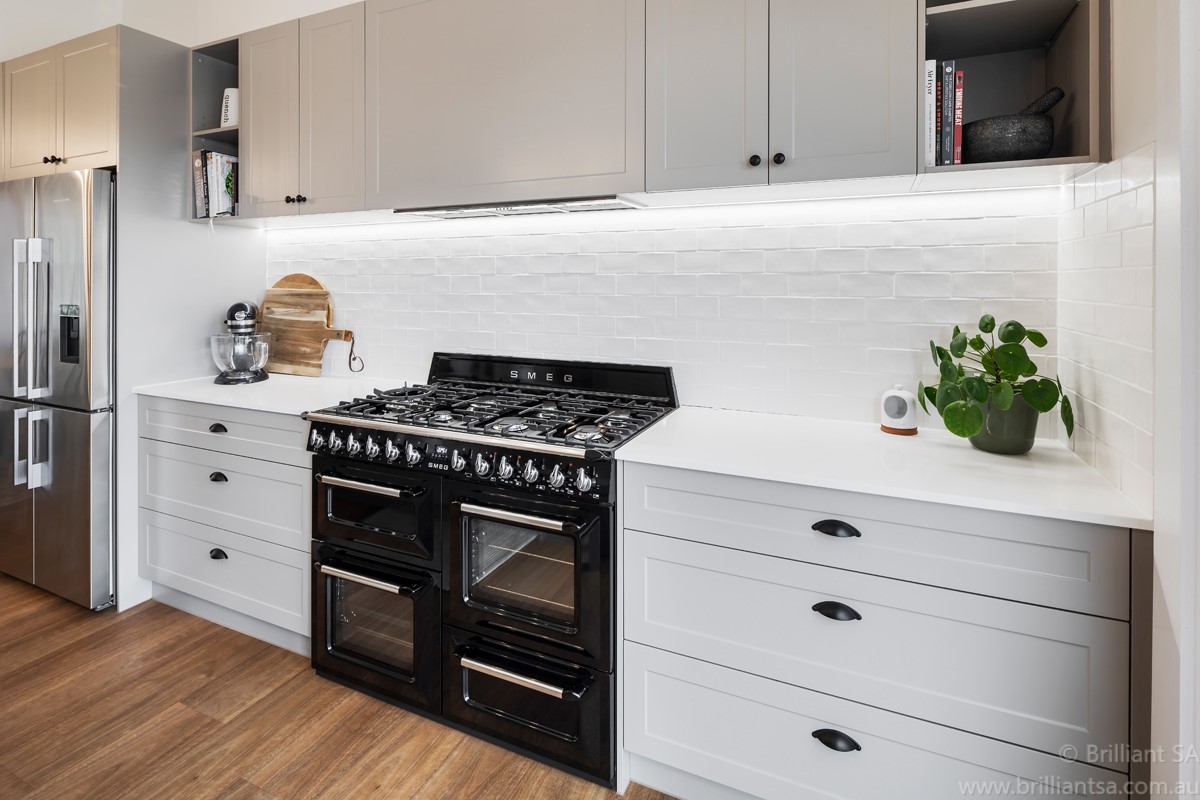
Caesarstone Benchtop, in Snow
Kitchen Benchtop Basics
The first step is to get clear on your priorities and then narrow down your options as you focus on what’s most relevant for you, your family, the way you live and the way you cook. Here are some factors you should consider:
- The look and feel, and degree of luxury or statement you want to create
- Durability
- Ease of care and maintenance
- Hygienic factor
- Sustainability and environmental considerations
- Cost
Kitchen Benchtop Materials
Let’s look at the main options:
- Porcelain
- Natural stone
- Solid surface
- Stainless steel
- Concrete
- Timber
- Laminate
- Engineered stone
Porcelain
A relative newcomer in kitchen benchtops, porcelain slabs have become more popular in Australia in recent years. Known for their high strength and durability, porcelain surfaces are ideal for busy kitchens and serious home cooks. With an impressive array of colours and finishes on offer, porcelain can be specified in both matte and polished finishes. Most porcelain is made by printing a pattern or design onto the surface of the slab. The latest technology is producing amazing colours and textures for durable and attractive finishes.
PROS – Extremely robust, porcelain is resistant to scratching, cracking, chipping and staining, and can withstand high temperatures. It does not require sealing and it is very easy to maintain. Porcelain can also be cut into smaller slabs and used for wall or floor tiling for a consistent design aesthetic. As it’s a printed product, new patterns and designs are released regularly, keeping up with today’s design trends.
CONS – Because the pattern or design is printed onto the surface, you may see a bare-finished edge, depending on the edge profile chosen. The edge can be mitred to provide the appearance of the pattern continuing throughout the slab. You are limited by the size of the slab available, which may mean living with some joins in your benchtop.
Porcelain is a beautiful option for kitchen benchtops and, with its hardwearing nature, will keep its good looks throughout the life of the kitchen.
Top brands include Dekton, Vasari, Ibrido and Infinity
Let's Get Started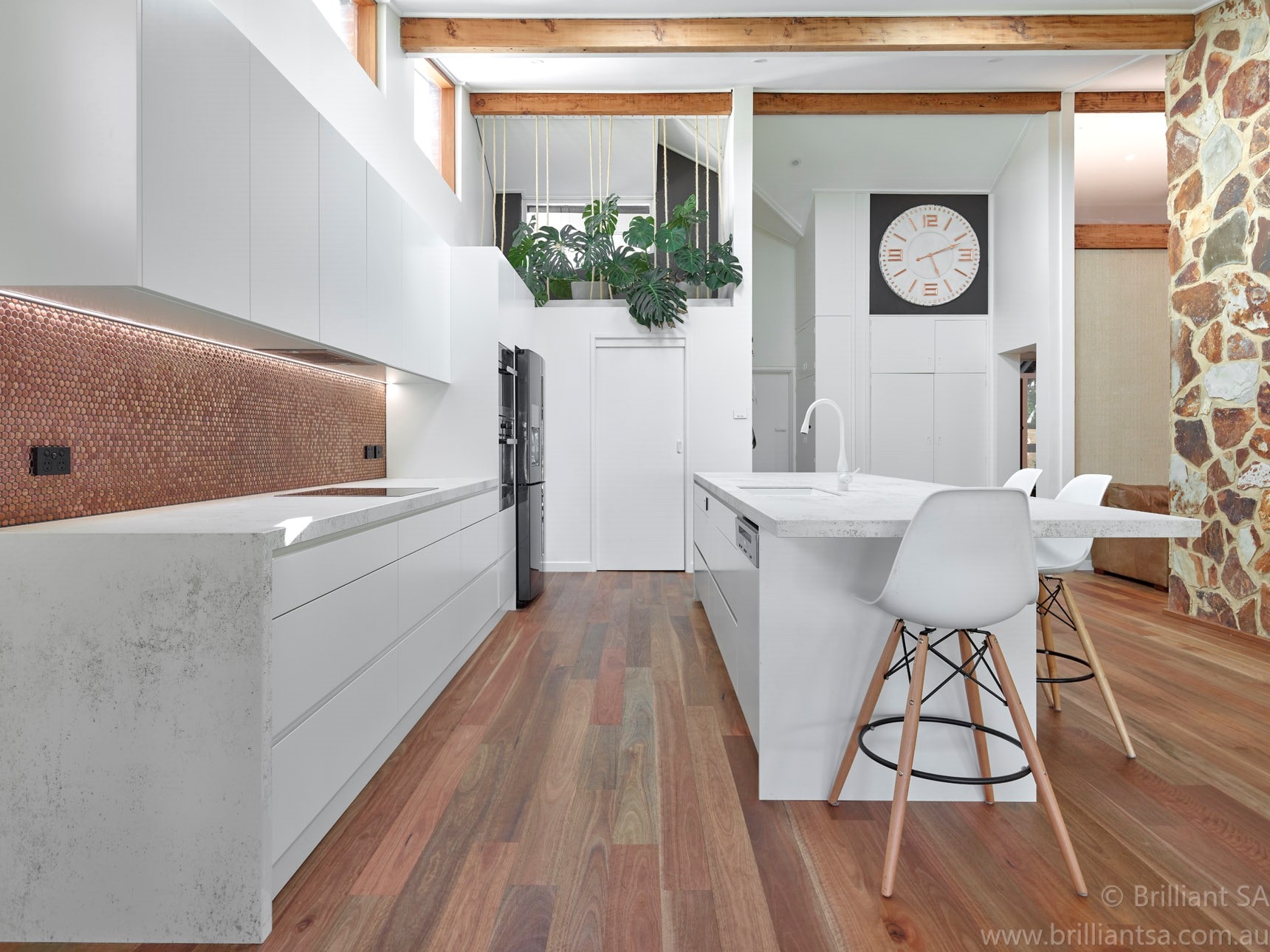
Porcelain Benchtop, Dekton, in Nilium
Natural stone
The most popular natural stone used for kitchen benchtops are granite, limestone and marble. Granite is the hardest of the natural stones and is ideal for kitchen environments as it is incredibly durable. Limestone is similarly durable, while marble is the softest of the natural stones and is susceptible to scratches and chips, so it’s generally not recommended for high-use areas. Natural stone is usually chosen for its unique quality – no two slabs are ever the same – and natural stone is an opulent addition to any kitchen. Natural stone is quarried in huge blocks and then cut into slabs before being polished and sealed.
PROS – Nothing in the world feels or looks like natural stone and its inclusion in your kitchen will provide a visual “wow” factor and a talking point. As a luxury element, natural stone can add a beautiful ambience while providing a hardwearing surface for your workspace.
CONS – Be aware of the specific maintenance requirements of the stone you have chosen to ensure you look after your investment. You will be limited by the size of the slab, so allow for joins in your benchtop.
Being a natural material, it’s important to go out to the stone supplier and select the specific slab to be used in the kitchen, as they can vary significantly.
Top suppliers of natural stone include: Cosentino, Complete Marble & Granite (Adelaide) and CDK Stone.
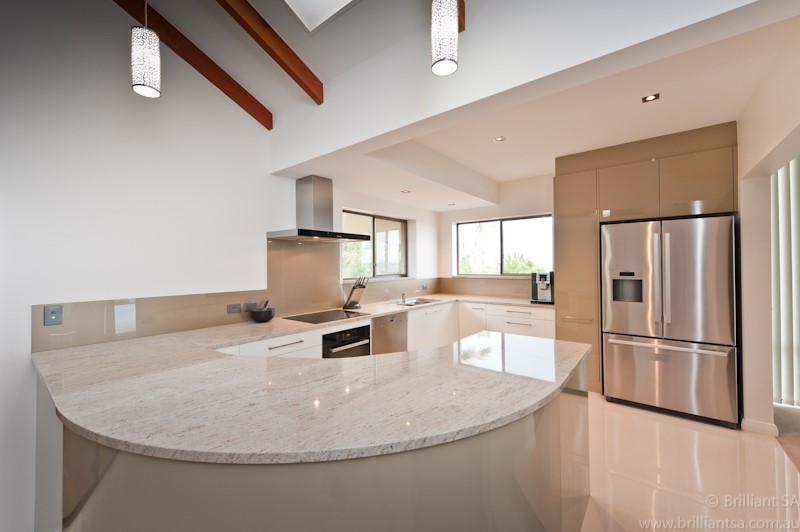
Granite Benchtop, Millenium Cream, Polished Finish
Solid Surface
Solid Surface materials are made from natural minerals refined from bauxite and blended with pure acrylic resin to create a high-performance solid surface. Acrylic solid surfaces contain no crystalline silica, making them a worker-friendly choice for bespoke benchtops.
With a seamless joining method, it can be fabricated to suit any length, shape or size, making it versatile and very hygienic. Solid surfaces are available in a wide range of colours and textures, with different qualities and grades (some are fire resistant). This non-porous material is not only stain and impact resistant, but also very easy to repair if scratched, cracked or chipped. Very popular for both homes and medical environments because of its hygienic properties, acrylic/solid surface is durable and versatile, although care must be taken to avoid heat damage.
PROS – Hygienic and very easy to clean and maintain. Straightforward to install, lightweight and flexible, solid surface is also recyclable and can be thermoformed into a variety of shapes. New colours and patterns are released regularly to stay in step with current kitchen design trends. A warmer and softer feel than stone or stainless steel.
CONS – Can chip and scratch like most benchtop materials (although repairable) and susceptible to heat damage.
Acrylic/solid surface is known for its flexibility as it can be thermoformed into almost any shape and size, with no visible joins.
Top brands include: Staron, Corian and Hi-Macs
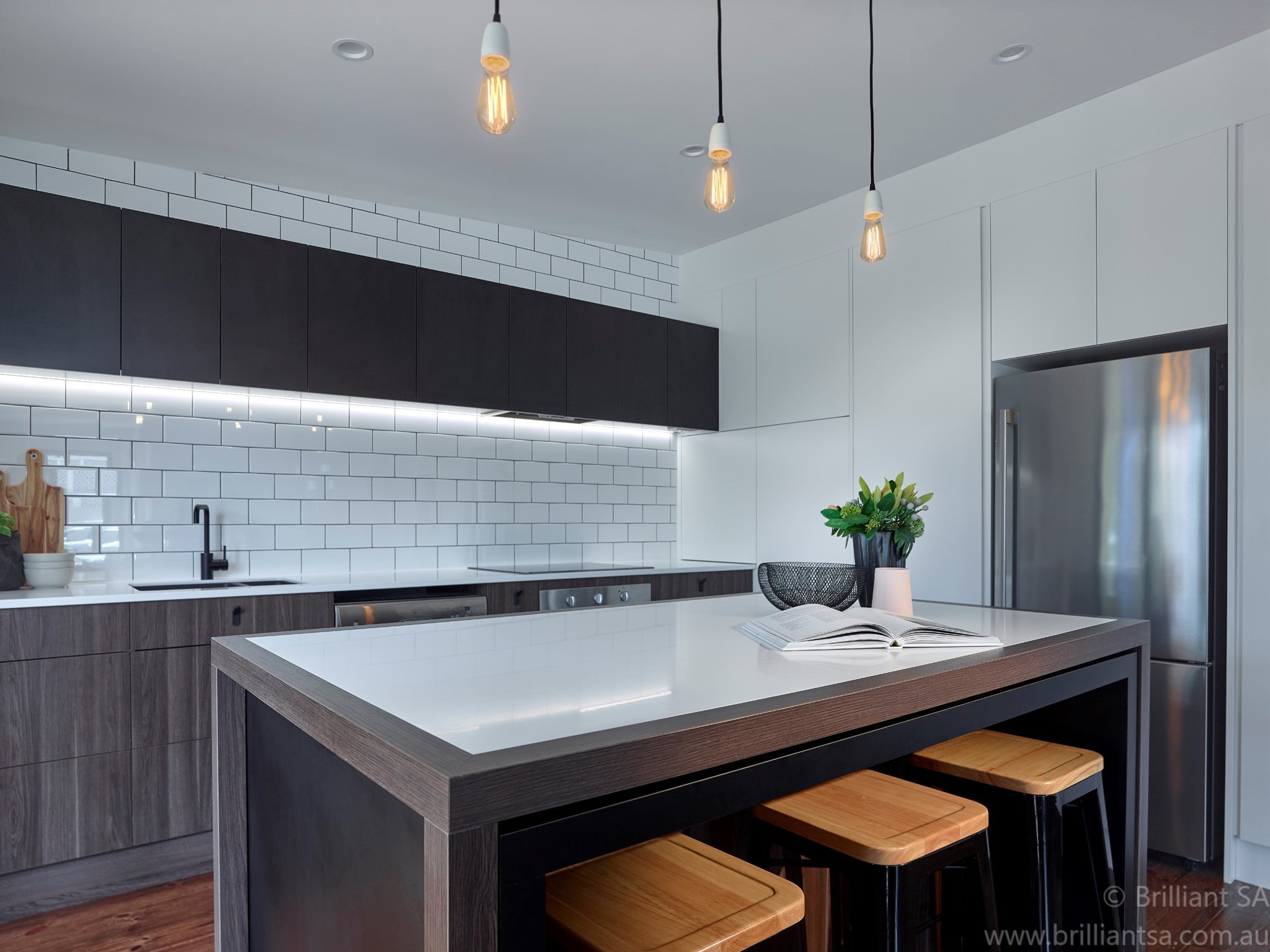
Custom Solid Surface Benchtop, in Natural Quasar White
Stainless Steel
The king of the commercial kitchen, stainless steel has many attributes that make it the perfect benchtop surface and it tends to be more suited to industrial designs or contemporary and ultra-modern kitchens. Stainless steel is hardy and hygienic (the joins are seamless) – the reason it features in commercial kitchens. Low-maintenance, stainless steel is easy to keep clean and also provides a “wow” factor. This surface will scratch and scuff with heavy use, and many see that character as adding to the visual appeal of the benchtop.
PROS – Incredibly durable and hygienic, stainless steel is also easy to keep clean and is chemical-resistant. It can be moulded and shaped easily and can include seamlessly integrated sink or cooktop elements.
CONS – Can show streaks, scratches and marks with heavy use.
In residential kitchens, stainless steel is often used as a complementary surface in the main cooking zone and paired with other benchtop finishes to “soften” the visual appeal of the kitchen. There are different grades of stainless steel but 304 is the standard used for kitchens around the world.
Let's Get Started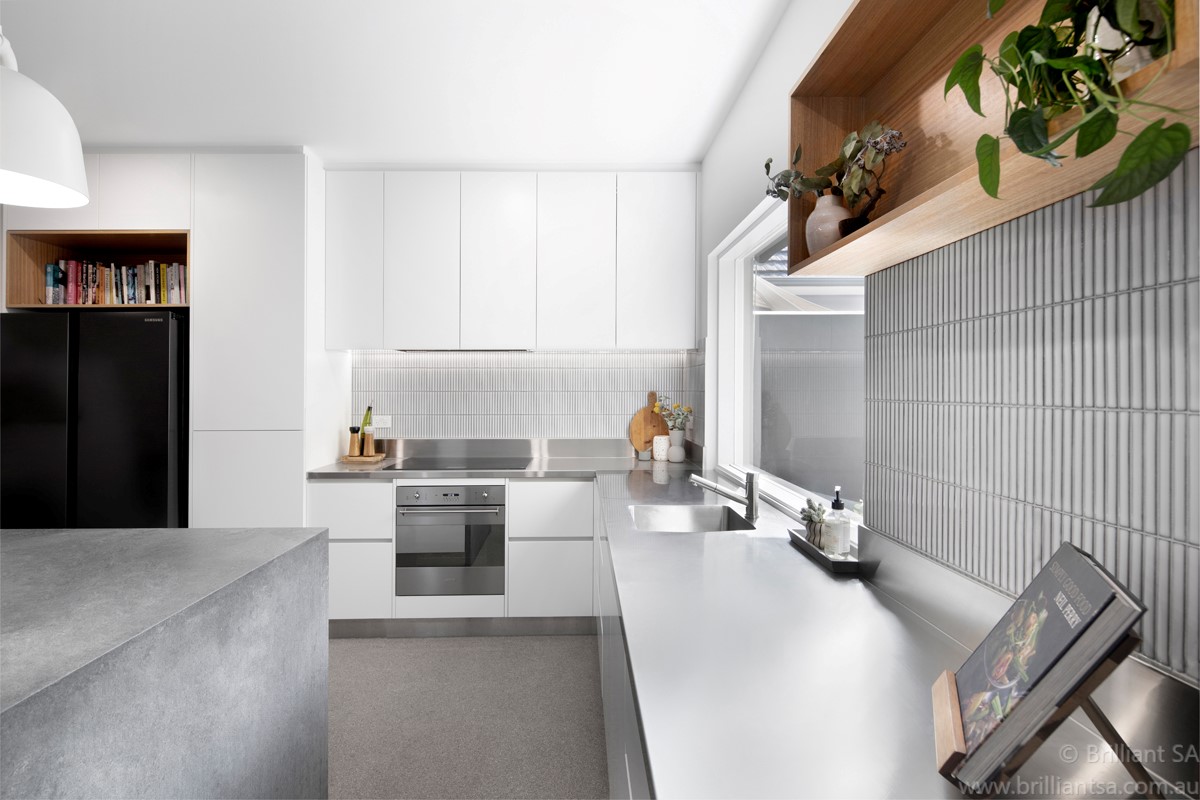
Custom L-Shaped Stainless-Steel Benchtop
Concrete
Sleek and highly durable, concrete benchtops have become more popular in recent years, particularly for contemporary-style kitchens and al-fresco areas. The concrete is mixed with glass fibres for reinforcement and then poured into a customised mould and set in the specific shape and size needed. Once cured, it’s polished and sealed in either a gloss or matte finish to suit the design of the kitchen. With no joins, you have a very hygienic benchtop that is also heat resistant. Care must be taken to avoid chipping and stains and it will need periodic maintenance and a good sealant to keep it looking its best.
PROS – Highly durable, concrete can be poured without joins to make a single slab and even complex shapes, making it endlessly customisable.
CONS – Concrete is porous and will need correct sealing to protect against stains. It can also chip if damaged and be prone to cracks; however, these can be easily fixed.
Concrete benchtops are hand-made by specialist fabricators in your area, chosen and recommended by your kitchen company.
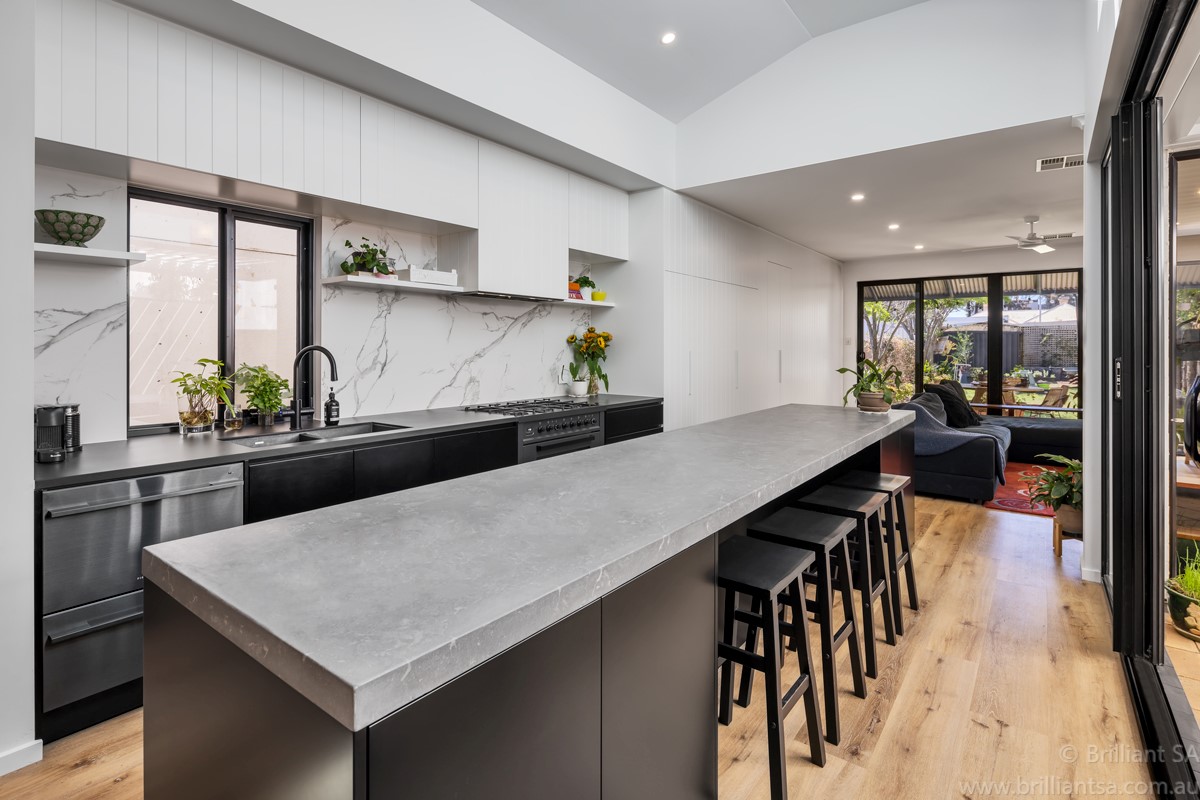
Custom Solid Concrete Benchtop on Island, Honed Finish
Timber
Timber has been a staple in kitchen design for millennia. Its popularity comes from its ability to add warmth and texture as well as being a highly workable and flexible product with which to create many kitchen elements. Timber is very popular for classic/traditional kitchen designs but also in Scandi or contemporary-style kitchens to add a textural focal point. Care needs to be taken with heat and your timber benchtop will need to be sealed and cared for during its lifetime. Being a softer material, timber is prone to scratches, but these are considered to add to the rustic appeal of this material and can be repaired if desired.
PROS – Adds a beautiful element of warmth and can be applied to a wide range of kitchen designs. Easy to sand back if scratched, and gives a timeless, natural appeal.
CONS – Needs maintenance to prevent staining and damage. Being a softer material, it is prone to scratching, and timber will need to be well-sealed to prevent damage.
Timber has an ageless appeal that makes it perfect for a kitchen environment. It also has the benefit of being recyclable and repurposed or upcycled to create interesting or unique pieces.
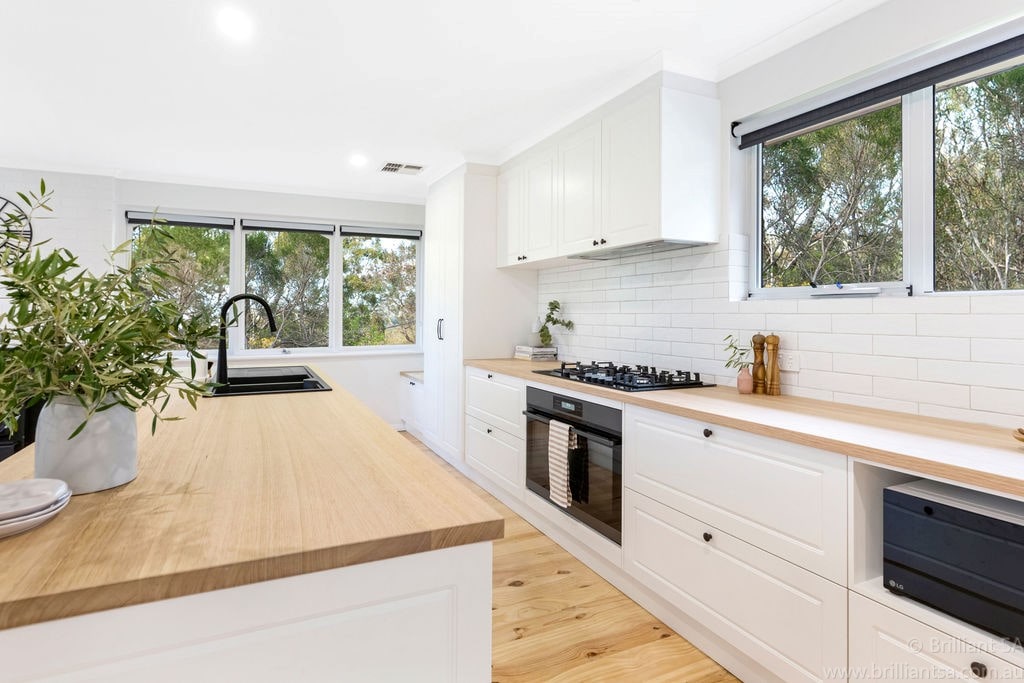
Custom Solid Tasmanian Oak Benchtops
Laminate
Laminate is suitable for all kitchen styles. It comes in many different finishes and styles to suit a variety of kitchen designs, from realistic wooden grains, stone patterns, or matte finishes. It is the most cost-effective benchtop material. Laminate is also highly durable and versatile, and easy to maintain while requiring limited maintenance. Perfect for busy family households, many laminate surfaces now include additional hygienic properties.
PROS – Laminate is very durable and cost-effective. It comes in a massive array of colours and textures and the material is well-known for being water-resistant, stain-resistant, and scuff-resistant.
CONS – Laminate can lose its shine over time and the material can be susceptible to scratching and scorching from high heat. Laminate can also be difficult (almost impossible) to repair. You will be limited by the length of the sheet, be prepared to allow for some joins in your design.
Laminate is cost-effective but not repairable – it’s more often replaced than repaired. So it may not withstand the life of the kitchen.
Top brands include: Polytec, Laminex, Wilsonart and Abet Laminati.
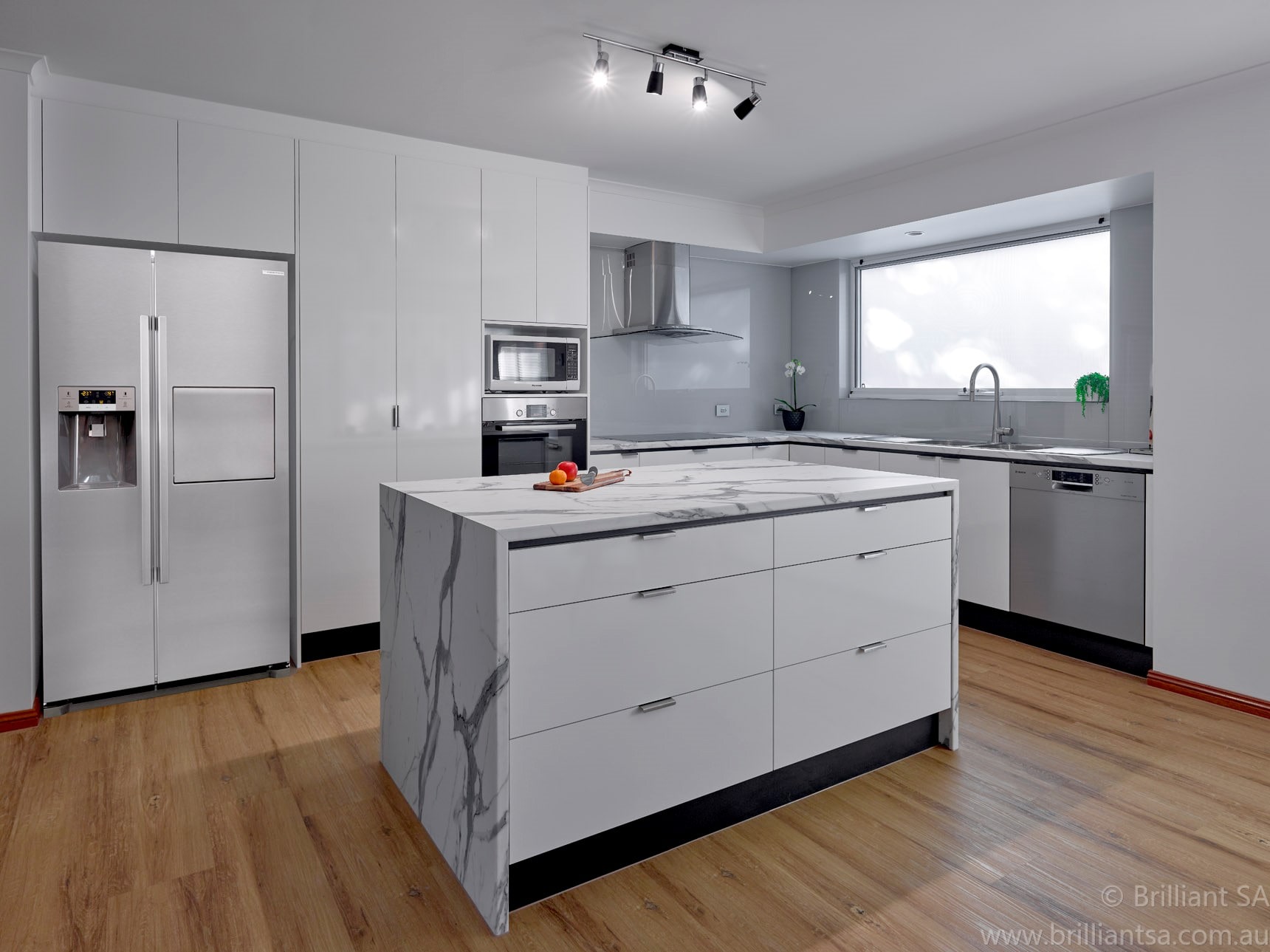
Laminate Matera Range, Polytec, in Calcutta Grey
Engineered Stone
Engineered stone is predominantly made from finely ground quartz (one of the strongest minerals known) mixed with a small amount of polymer resins for binding and pigments for different colours and styles. It is durable and low maintenance, as well as chip and scratch resistant, and it can be repaired if damaged. It is non-porous, so it is great at repelling stains and can be easily cleaned with a soft cloth and non-abrasive dishwashing liquid. Its qualities make it ideal for kitchen surfaces as engineered stone can provide the same timeless look and elegance of natural stone with a consistent appearance (every slab is the same), allowing this material to really shine and stand the test of time.
Recent public and industry awareness of the very high silica content in engineered stone, highlighted the risk of to silicosis in workers. Since 1 July 2024, fabricating or installing conventional engineered stone is prohibited by law (except in controlled removal or repair situations). South Australia implemented a transitional period through 2024 for prior contracts, but as of 2025, no new engineered stone benchtops can be installed in SA homes. It should be noted that all natural stone contains silica and some such as sandstone and granite, have high silica concentration.
PROS – Engineered stone is highly durable, non-porous and repairable. It comes in a wide range of styles, colours and textures with new designs released regularly to stay in touch with current trends. Being a manufactured material, the appearance is consistent and predictable, whereas natural stone is not.
CONS – Banned in Australia since 2024. Care needs to be taken with high heat and certain chemicals which can damage the surface of engineered stone. You will be limited by the size of the slab, so be prepared to have some joins in your benchtop.
Engineered stone’s popularity has plummeted due to these health concerns. South Australia implemented a transitional period through 2024 for prior contracts, but as of 2025, no new engineered stone benchtops can be installed in SA homes. safework.sa.gov.au Leading suppliers now offer some low-silica products, with some transitioning to zero-silica. Zenith and other major brands introduced completely silica-free ranges by mid-2024.
Top brands include: Cosentino, Silestone, Smartstone, Stone Ambassador and Quantum Quartz
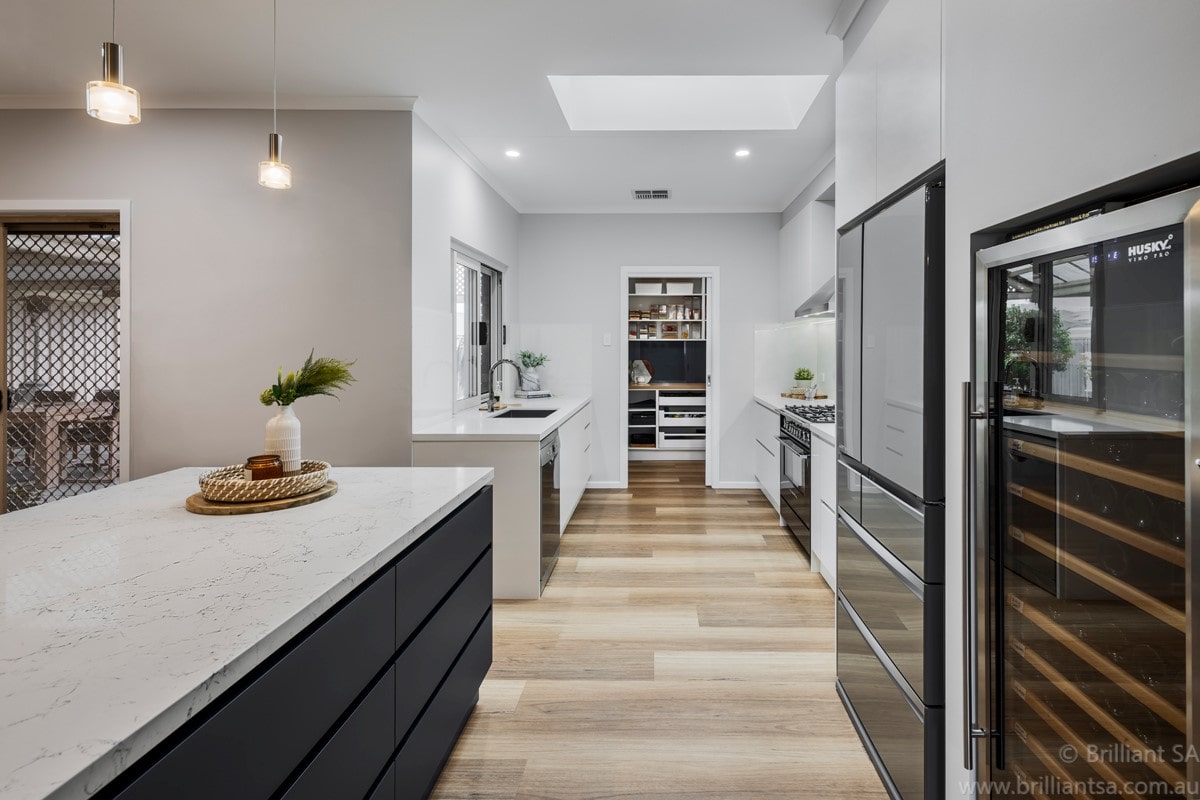
Engineered Stone on Kitchen Island, Caesarstone, in White Attica
Kitchen Benchtop Elements
Island Benchtops
Island benches allow for additional prep space while also doubling as an extra eating zone for entertaining, or homework/office station. Island benches are popular in most open kitchen designs as they allow for the kitchen to be easily zoned and help manage traffic flow.
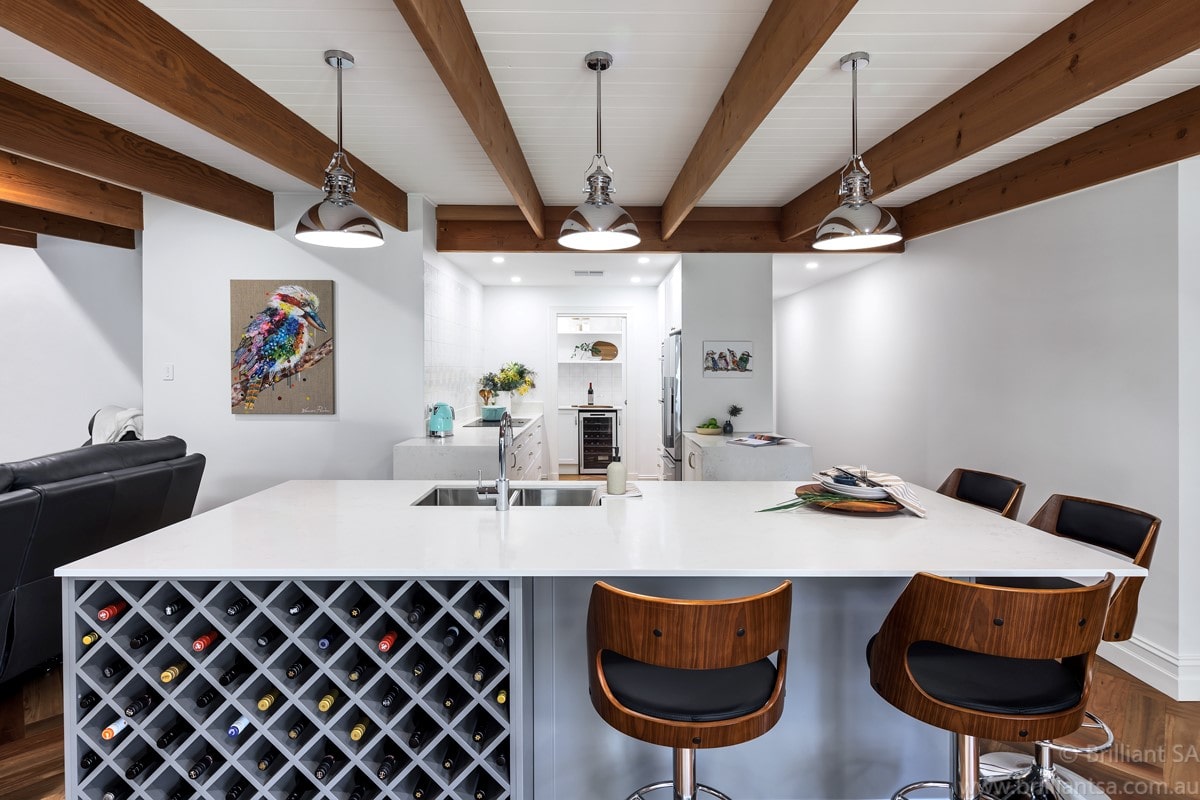
Island Bench Offering Wine Storage, Seating & Additional Bench Space for an Entertainer’s Kitchen
Waterfall Benchtops
This is the continuation of the benchtop to the edge of the cabinet and down to the floor, to create a beautiful and seamless flow to the countertop. Suited to more modern abodes and contemporary kitchens.
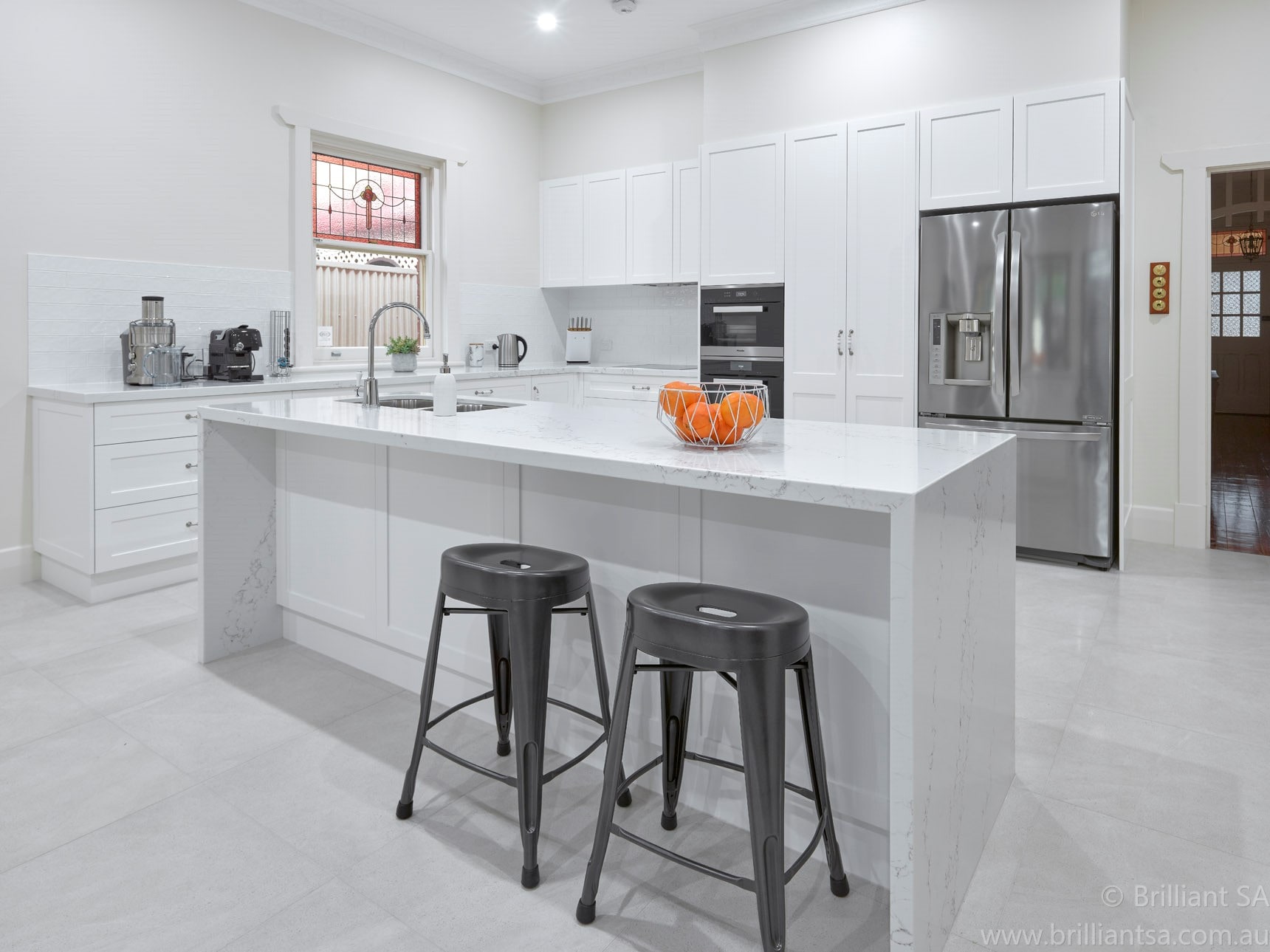
Waterfall Benchtop Elegantly Featured in this Fresh, Contemporary Kitchen
Split Benchtops
Using more than one material type, thickness and height is an effective way of combining a working bench with a normal height table or bar, while creating a visual interest with materials and shapes.
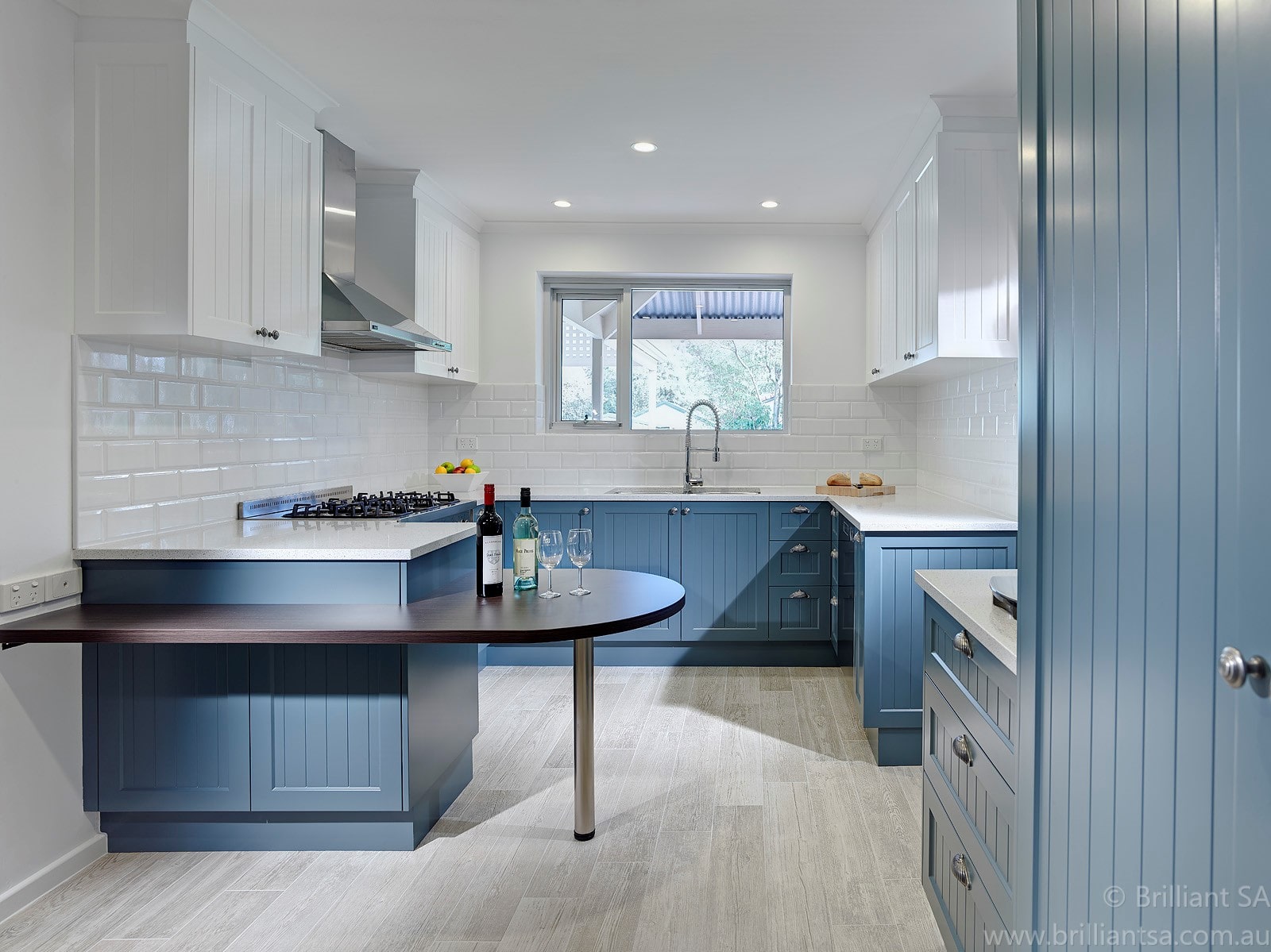
Split Benchtop (high): Caesarstone, Nougat (low): Polytec, Belgian Oak Matt. Functional for Both Working & Entertaining Purposes
Benchtop Edges
The edge availability for your kitchen benchtop will also depend on the material you have chosen to utilise. Benchtop thicknesses depends on material chosen. They can come in a range of options including:
- Bullnose
- Half bullnose
- Pencil nose
- Pencil round
- Square edged
- Shark nose
- Lambs tongue
- Extra thick (wrap-around)
Kitchen Benchtop Trends
Today’s kitchen design trends are all about bringing an element of warmth and comfort into the kitchen environment. With many homeowners spending more time in the home and kitchen, we’re increasingly wanting an inviting atmosphere that creates a calming experience. Neutral tones with natural colours and a blend of textures and materials combine to provide a variety of focal points and stunning features.
Statement island benches are still going strong, with bold and dramatic lines and colours to add a slice of drama into your kitchen design. Transforming the entire island bench into a butcher’s block is also gaining popularity. Thicker benchtops are also trending with many homeowners opting for cantilevered ends for an extra luxury feel.
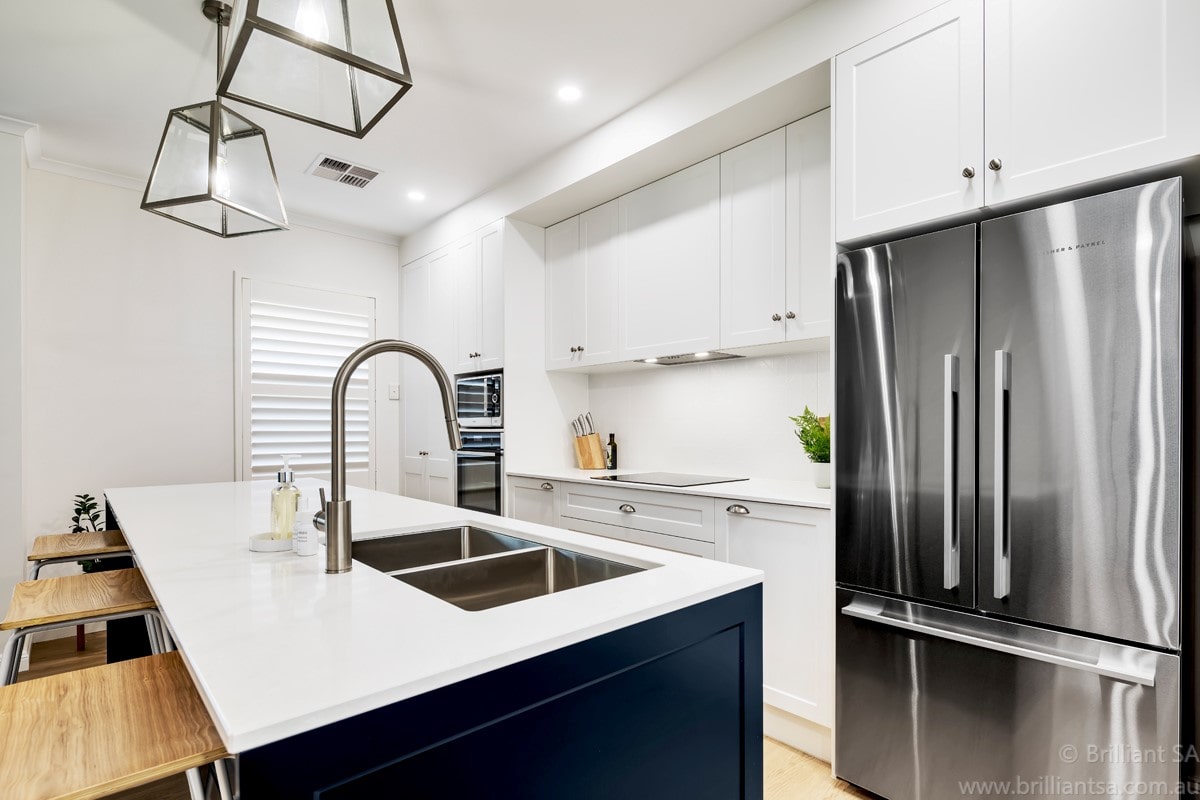
Warm & Inviting Hamptons Kitchen, featuring Engineered Stone Benchtop by Caesarstone, in Organic White
How to choose a kitchen benchtop material
Material selection should not be an afterthought, as the characteristics and installation requirements of the chosen material need to be considered in the overall design. As with any element you choose for your kitchen, you must consider how well the material meets your unique needs. Most kitchens are busy household centres so durability and hygienic qualities will be important. But the main consideration is what you need from your kitchen benchtop and that will come back to how you live, how you cook and how you entertain. It’s important to be informed and ask lots of questions to ensure the product you eventually choose is fit-for-purpose and will meet your expectations.
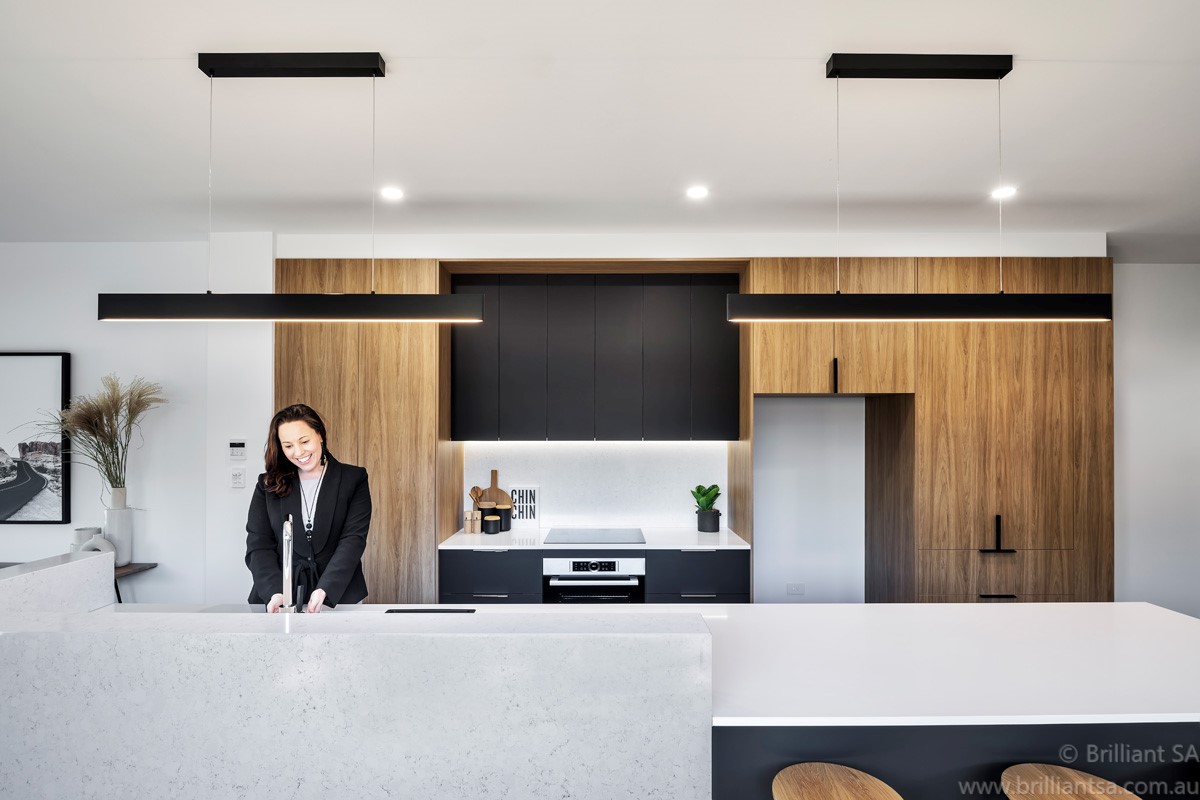
Villa Project Featuring Steedform, Caolino Benchtop & Steedform, Fino Venato Feature Stone
What does Brilliant SA recommend and why?
At BSA, when we work with a client we focus on what product or material is going to be most appropriate for the style of kitchen they want and the type of lifestyle they enjoy. The information above is a helpful start for clients to feel informed about the range of options available. For us, the most important recommendation is the one that will best suit the clients and their unique needs.
At Brilliant SA, our kitchen designers stay informed about product developments and new styles or designs to ensure we are making the most relevant recommendations on material, design, colour, style or finish. We can provide you with advice, talk through your options, and help you understand the choices available to ensure you end up with a benchtop that is suited to your needs. We work with tried and tested brands and suppliers for each material category so our specialist team is well placed to provide you with expert advice and guidance.
We’ve been renovating kitchens for happy Adelaide homeowners for more than 20 years and we’ve built a reputation for excellence in customer service, specialist design and quality workmanship. In addition to our class-leading Warranty, we provide all our customers with a Brilliant SA Guarantee which means we take full responsibility for every detail of your renovation project
Come and visit our kitchen showroom where we feature the best and latest in kitchen brands and design.
If you’d like to learn about the benefits of renovating with a full-service kitchen renovation company, then talk to us today.
Let's Get Started

